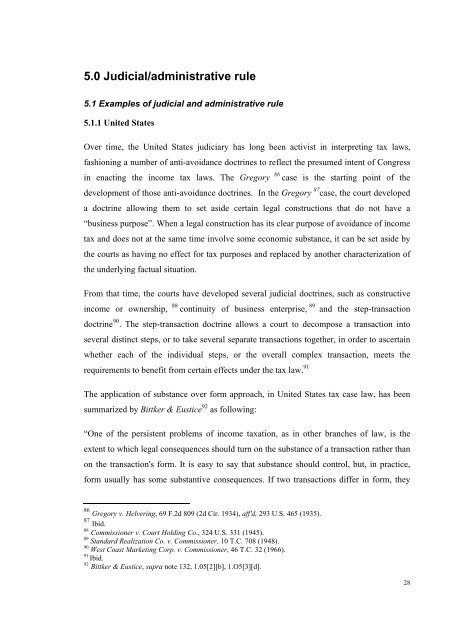Tax Avoidance: Causes and Solutions - Scholarly Commons Home
Tax Avoidance: Causes and Solutions - Scholarly Commons Home
Tax Avoidance: Causes and Solutions - Scholarly Commons Home
You also want an ePaper? Increase the reach of your titles
YUMPU automatically turns print PDFs into web optimized ePapers that Google loves.
5.0 Judicial/administrative rule<br />
5.1 Examples of judicial <strong>and</strong> administrative rule<br />
5.1.1 United States<br />
Over time, the United States judiciary has long been activist in interpreting tax laws,<br />
fashioning a number of anti-avoidance doctrines to reflect the presumed intent of Congress<br />
in enacting the income tax laws. The Gregory 86 case is the starting point of the<br />
development of those anti-avoidance doctrines. In the Gregory 87 case, the court developed<br />
a doctrine allowing them to set aside certain legal constructions that do not have a<br />
“business purpose”. When a legal construction has its clear purpose of avoidance of income<br />
tax <strong>and</strong> does not at the same time involve some economic substance, it can be set aside by<br />
the courts as having no effect for tax purposes <strong>and</strong> replaced by another characterization of<br />
the underlying factual situation.<br />
From that time, the courts have developed several judicial doctrines, such as constructive<br />
income or ownership, 88 continuity of business enterprise, 89 <strong>and</strong> the step-transaction<br />
doctrine 90 . The step-transaction doctrine allows a court to decompose a transaction into<br />
several distinct steps, or to take several separate transactions together, in order to ascertain<br />
whether each of the individual steps, or the overall complex transaction, meets the<br />
requirements to benefit from certain effects under the tax law. 91<br />
The application of substance over form approach, in United States tax case law, has been<br />
summarized by Bittker & Eustice 92 as following:<br />
“One of the persistent problems of income taxation, as in other branches of law, is the<br />
extent to which legal consequences should turn on the substance of a transaction rather than<br />
on the transaction's form. It is easy to say that substance should control, but, in practice,<br />
form usually has some substantive consequences. If two transactions differ in form, they<br />
86 Gregory v. Helvering, 69 F.2d 809 (2d Cir. 1934), aff'd, 293 U.S. 465 (1935).<br />
87<br />
Ibid.<br />
88<br />
Commissioner v. Court Holding Co., 324 U.S. 331 (1945).<br />
89<br />
St<strong>and</strong>ard Realization Co. v. Commissioner, 10 T.C. 708 (1948).<br />
90<br />
West Coast Marketing Corp. v. Commissioner, 46 T.C. 32 (1966).<br />
91<br />
Ibid.<br />
92<br />
Bittker & Eustice, supra note 132, 1.05[2][b], 1.O5[3][d].<br />
28

















